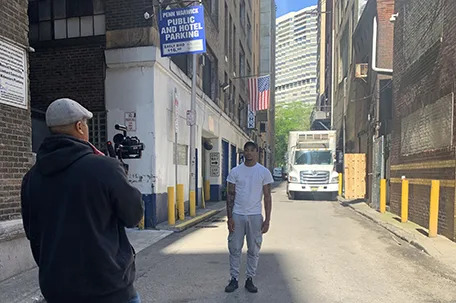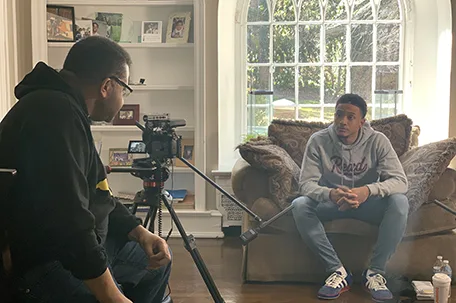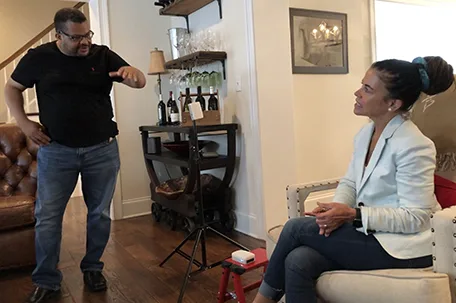By Raymond Jones
EPISODE 1
In the three-part episodic documentary, “72 Seconds in Rittenhouse Square,” director Tigre Hill brings to the screen a searing Philadelphia story. He examines the racially divisive criminal case of the fatal 2018 encounter between Michael White, a young Black man, and Sean Schellinger, a well-connected white developer. You may think you know the story — but do you?
Part mystery, part detective story, Hill’s visceral exploration into the media saturated murder in the Rittenhouse Square neighborhood reveals many unrealized victims with few celebratory winners. The “72 seconds” in the title refers to the estimated time that elapsed between the encounter of Schellinger and White that forever changed their lives and the lives of those who loved them.
In the first episode, viewers are transported back in time to a balmy July night in 2018. Hill introduces us to the hip summer night life of Rittenhouse Square, where limousines double park in front of expensive eateries and six-figure deals are made after hours over cocktails.
As voyeurs watching the scene through restaurant camera footage at the posh Rouge restaurant, viewers of the episode see Schellinger, looking younger than his 37 years, and friends enjoying a night out. Flickering black and white silent video of Schellinger– laughing, talking, drinking while voices and interviews from families and friends who knew him narrate the evening. Schellinger’s friends describe him as someone “with a smile that could light up a room” and with a personality to match.
Suddenly, the viewer is transfixed, watching a black and white audio grainy video of a chaotic scene in the alley of 17th and Callowhill, with Sean’s friends yelling and screaming as a shadowy figure in a white t-shirt quickly dashes past onlookers. The figure is described as a Black male, six-feet tall with a white t-shirt. Barely recognizable, the person disappears into the night through Rittenhouse Square Park, as Schellinger’s friends scream in horror at the realization that he has been stabbed and is dying in front of their eyes.

After that tumultuous scene, Hill painstakingly introduces us to Schellinger’s family, his high school friends, and his work partners, who all share glowing stories about his natural leadership and friendly persona. Sean is described as a beloved, gregarious, youthful, upwardly mobile young man with everything in life to live for before he was killed — a killing presumed to be unprovoked and premeditated with malice.
With the constant media drumbeat on every TV station in town of the “knife-wielding killer” as subtext, the episode shifts chronicling the city-wide manhunt that was announced after Schellinger was killed. Hill also skillfully highlights the news coverage of the time and the disbelief that someone could be murdered in the affluent Rittenhouse Square neighborhood. After all, as one person interviewed in the episode says, “this isn’t supposed to happen in Rittenhouse Square. It isn’t North Philadelphia.”
The film provides scenic views and commentary from long-standing residents of the Rittenhouse neighborhood and its tree-lined streets boasting a median individual income of over $105,000.
Shortly after the city-wide manhunt — unsolicited, and totally unexpected — White, a 20-year-old African American man with a smooth caramel teenage face, turns himself in. It is a stunning turn in the case, given that the police had no suspects.
Along with friends and family, the first episode introduces us to a litany of speakers and guest stars throughout the three episodes, including names familiar to viewers that include defense attorney Michael Coard and District Attorney Larry Krasner. As the episode concludes, Hill presents the full breadth of the story and gives voices to Philadelphia’s unique neighborhood perspectives on the case, complete with Philadelphia Eagles paraphernalia and neighborhood vernacular. The episode ends with a quasi-confession from White with little or no recollection of the evening and very few details.

EPISODE 2
Hill introduces White, the accused, and interviews with his mother and the gentlemen that helped him turn himself in. In this episode, White is portrayed as a sensitive youth with no history of criminal activity, but tormented by family secrets. His mother describes him as a “good boy,” praise she insists she would extend to him even if he were not her son. A seasoned public attorney acknowledges, on camera, White’s history seems to be in direct opposition to the crime he is accused of — the director’s first introduction to the possibility that “something just doesn’t fit.”
The director is careful to remove the scab from the criminal justice system throughout this episode, allowing the viewer firsthand witness to detective interrogation rooms, the litany of criminal justice departments and divisions and the dizzying web of legalese and lawyer jargon. Michael at first has no idea what happened that night. As if he was an actor in a dream, he vacillates, denies, agrees, and cries, then totally dismisses any rationale for the predicament he finds himself in. And he is in quite a predicament — facing a life sentence if convicted of first-degree murder charges.
As a viewer, you are taken along as the director unfolds more information, you begin to fully experience the trauma with Michael having agonized and vacillated emotionally now for two episodes. “Did Michael kill Sean in cold blood or, as Michael began to remember, was it an accidental death in self-defense?” the viewer finds themselves wondering. The film poses contradictory points of view through passionate personal testimonies.

EPISODE 3
In the final episode, the complete story comes to light with the director of the Defenders Association of Philadelphia at that time, Keir Bradford-Grey, taking the lead in the murder case — her first time trying a such a case.
“As a Black mother, I thought it was important to stress the nuanced feelings of protection and Michael’s innocence until proven guilty, something I thought my team may not understand,” she said in the film. “I saw him like a son.”
The Defender Association of Philadelphia’s research team also found damaging evidence and a possible pattern of aggressive behavior from Schellinger. Ten years prior, he was arrested in Florida and taken out of a club. His behavior in that altercation was described as resembling that of “a rabid racoon in a barn.”
While a student at Penn State, Schellinger’s aggressive behavior was further demonstrated when he broke into a home while intoxicated and resisted arrest. In that case, according to police, he “bull rushed” the police officer as they attempted to apprehend him.
That similar characterization, of being “bull rushed,” was expressed by White regarding the night of the argument that led to the altercation resulting in the killing. Although White had a knife for protection, his description of backing away before he was rushed by Schellinger made the self-defense argument plausible.
The reenactment of White’s testimony on the stand is riveting. Also, as a viewer, you get to see the full breakdown and description of the grainy video fight and the explanation of the stabbing. It is a clear, must-see moment that helps viewers to better understand the journey through each episode. For added drama, DA Krasner is featured as a lighting-rod in this case — a convenient “whipping boy” for Schellinger’s family as it appears that the case may rule in the favor of White.
As Episode Three ends, Hill helps the audience better understand the pain of all the family members involved. As a viewer, you feel completely exhausted after watching the courtroom drama.
Like any good filmmaker, Hill leaves us with unresolved ambivalence: the Schellengers originally won the right of the highest conviction, murder in the first degree, yet lost the case through a myriad of legal maneuvers, leaving them bitter about the justice system. It is an ironic twist of fate for them — as white Americans — but all too familiar for African Americans involved in the same system.
White won the case, gaining his freedom. He helped save his own life, but in the process, lost his innocence. The documentary clearly shows White struggling with the privilege of being able to pick up where his life left off — a privilege taken for granted by many white people who are often victorious in criminal justice cases.
“My intent was to tell the story as best I could, with the facts as I saw them, and let the viewers decide,” Hill said.
In “72 seconds in Rittenhouse Square,” the intersection of race, privilege and the justice system will remain with the viewer a lot longer than the title suggests. The docuseries can be viewed on Paramount Plus at: www.paramountplus.com.
A quick Q&A with Tigre Hill, the director of the new docuseries ‘72 Seconds in Rittenhouse Square’
SUN: What was your inspiration for the documentary?
Hill: I remember hearing about [a] murder that happened in Rittenhouse. This happened during the Trump presidency in a town where progressive DAs were being elected. I saw this case as a microcosm of what the racial divide across the country [looks] like and I wanted to capture that—maybe to see how much has changed in society.
SUN: What were your observations in shooting the film?
Hill: We are a divided city. We are a city of divided neighborhoods. It’s better than it was in the past, but this case, in so many ways, this case is our ‘OJ’ moment in Philadelphia.
SUN: What is your final takeaway from spending time with the families, friends, lawyers of Michael White and Sean Schellinger?
Hill: Perception is reality.


